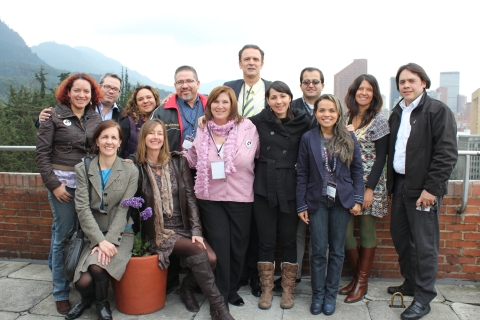Ricardo Villamil points out some information to Alejandro Gonzalez, two members of the team developing the Pilas Bogota map for the crowd sourcing project on crime in Bogota with ICFJ partner, El Tiempo. (Photo by Ronnie Lovler)
Knight International Journalism Fellow Ronnie Lovler, right, moderated a panel on investigative journalism in Colombia during the fifth annual conference of the Consejo de Redaccion in Bogota March 16 and 17. (Photo courtesy of Consejo de Redaccion)

Panelists for the Consejo de Redaccion’s fifth annual conference, held in Bogota March 16 and 17, line up for a group photo. ICFJ partner, the Consejo de Redaccion is an organization of investigative journalists in Colombia. (Photo courtesy of Consejo de Redaccion)
Alejandro Gonzalez reviews the reporting procedure for the Pilas Bogota map as Ricardo Villamil looks on. The map that will track crime in Bogota through crowd sourced reports is being developed with ICFJ partner El Tiempo.
Knight International Journalism Fellow Ronnie Lovler revising work on the Pilas Bogota mapping project being developed with ICFJ partner El Tiempo.
Imagine that you have just hailed a taxi off the street in busy, chaotic Bogota. Then, suddenly the taxi stops, someone else jumps in with you, and you find that rather than going to your destination, you have just been abducted.
On your “joy” ride, your abductors will be forcing you to visit a series of ATM machines, where they will oblige you to make withdrawals and empty your account. In Colombia, this is the “paseo millionario” or the millionaire’s ride, similar to the “express kidnappings” and robberies that occur in other Latin American countries, particularly Venezuela.
Crime and violence are still facts of life in Bogota, but a new digital mapping project I’ve developed along with ICFJ partner El Tiempo will use collaboration between citizens and journalists to record reports of “paseos” and other incidents of crime and violence, displaying times, dates and locations for all to see.
Our map, Pilas Bogota, takes its name from a popular slang expression, meaning ‘to be sharp or be alert.’ Pilas Bogota is patterned after another ICFJ mapping project in Panama, developed by Knight Fellow Jorge Luis Sierra. But our map here will have a uniquely Bogota focus. For example, we will have separate categories for the “paseos millionarios,” and cell phone thefts, two crimes that seem to be very much a concern in Bogota. Other categories include homicides, extortion, armed robbery, street brawls, drug use and trafficking, weapons and more.
Citizens will be able to send reports via email to the PilasBogota website or through a Twitter feed. A team of journalists and citizen journalists from all of El Tiempo’s converged media will be working behind the scenes to vet the reports and post them on the PilasBogota website.
Nor does it stop there. As part of my Knight International Journalism Fellowships project, I am training journalists from El Tiempo to monitor citizen reports on the map to follow trends or seek out leads for investigative stories or other journalistic reports.
The El Tiempo map is expected to go live in May.
The same process will be employed at a second crowd-sourced map now under development with Colombia’s Consejo de Redaccion, a nationwide organization of investigative journalists. The Consejo held its 5th annual conference in mid-March. I moderated a panel with Colombian investigative journalists. The organization’s membership also approved the mapping collaboration with ICFJ.
This map will track incidents of corruption nationwide. It will kick off first by mapping incidents of corruption reported by Colombian journalists and will expand to incorporate citizen reports of corruption as well. So a story like one done recently by the investigative team at Cali’s El Pais newspaper looking into incidents of administrative corruption involving the “mayor, his wife and some good friends” in Bogota’s third largest city, will have a home on the Consejo de Redaccion map as well.
Crime and corruption are facts of life in Colombia, like so many other places in the world. But our partners and ICFJ see the two crowd-sourced mapping projects as ways that journalists and citizens can collaborate in the effort to create a more transparent society here.